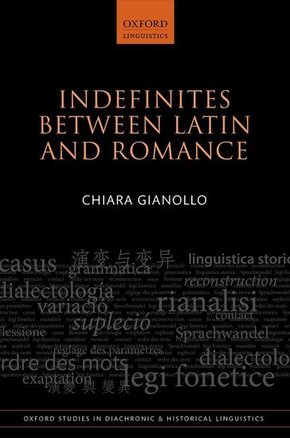
Indefinites between Latin and Romance
| Verlag | Oxford University Press |
| Auflage | 2018 |
| Seiten | 342 |
| Format | 15,8 x 24,2 x 2,4 cm |
| Print PDF | |
| Gewicht | 693 g |
| Artikeltyp | Englisches Buch |
| Reihe | Oxford Studies in Diachronic and Historical Linguistics 33 |
| ISBN-10 | 0198812663 |
| EAN | 9780198812661 |
| Bestell-Nr | 19881266EA |
This book investigates the syntactic and semantic development of a selection of indefinite pronouns and determiners between Latin and the Romance languages. It uses data from Classical and Late Latin texts and from electronic corpora of early Romance to propose a new account of the similarities in the grammar of indefinites across Romance.
This book investigates the syntactic and semantic development of a selection of indefinite pronouns and determiners (such as aliquis 'some', nullus 'no', and nemo 'no one') between Latin and the Romance languages. Although these elements have undergone significant diachronic change since the Classical Latin period, the modern Romance languages show a remarkable degree of similarity in the way their systems of indefinites have evolved and are structured today. In this volume, Chiara Gianollo draws on data from Classical and Late Latin texts, and from electronic corpora of the early stages of various Romance languages, to propose a new account of these similarities. The focus is primarily on Late Latin: at this stage, the grammar of indefinites already shows a number of changes, which are homogeneously transmitted to the daughter languages, leading to parallelism in the various emerging Romance systems. The volume demonstrates the value of using methods and models from synchronic th eoretical linguistics for investigating diachronic phenomena, as well as the importance of diachronic research in understanding the nature of crosslinguistic variation and language change.
Inhaltsverzeichnis:
1: The grammar of indefinites: Functions, variation, and change
2: Specific and epistemic indefinites in Latin
3: Aliquis from Latin to Romance
4: Indefinites and negation in the history of Latin
5: Developments in negative and polarity-sensitive contexts from Latin to Romance
6: Conclusions
Rezension:
Gianollo's Indefinites between Latin and Romance is a perfect example of how theoretical hypotheses raise empirical questions whose answers, when pursued with rigorous methods, can ground more general and solid theoretical analyses. It is also an excellent case of how a multidisciplinary approach that brings together syntax, semantics and pragmatics on the theoretical side and corpus research, philology and the history of language on the empirical side can make breakthrough advances in our understanding of language. Journal of Historical Syntax
